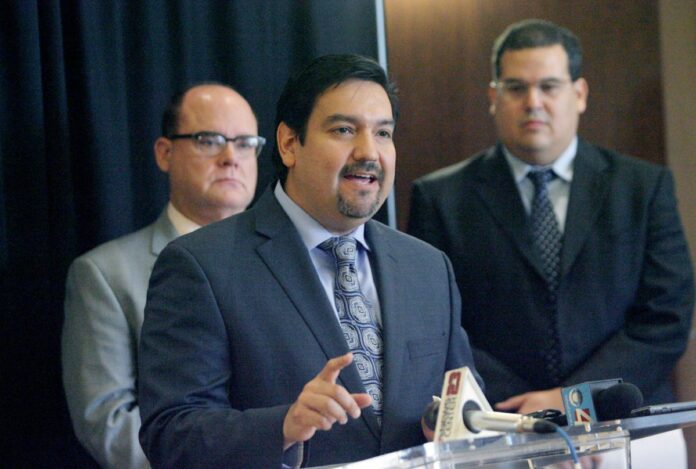
EDINBURG — A statewide conference will be held here to discuss disparities, emerging challenges and possible changes to the healthcare act as it pertains to border communities along the U.S.-Mexico border.
The Border Health Caucus will host the 12th annual Border Health Conference in the Rio Grande Valley for the first time since the group first began hosting the event. The caucus is an extension of the Texas Medical Association, the largest nonprofit group advocating for physicians and medical students in the country.
With over 50,000 members, TMA influences policy at the state and federal level, and the head of the organization is a local physician. Dr. Carlos Cardenas, board chairman at Doctors Hospital at Renaissance.
“Our hope is that by increasing awareness to the border and the healthcare issues that affect us, that we can make change,” he said Wednesday. “And that change comes in being able to influence policy.”
Prominent physicians, legislators and community stakeholders are expected to convene Friday at the Edinburg Conference Center at Renaissance, where three separate panels will discuss public health issues, like Zika and Dengue, infrastructure and possible changes to healthcare funding. Most panelists will hail from communities located between Brownsville and El Paso, as well as Corpus Christi and San Antonio.
“The delegates that have been designated to speak at the event are the ones that influence policy — the ones that influence change,” Hidalgo County Health Director Eddie Olivarez said.
Among those invited are U.S. Reps. Vicente Gonzalez, D-McAllen; Filemon Vela, D-Brownsville; and Sheila Jackson Lee, D-Houston. Gonzalez is currently part of the Problem Solvers caucus, a group of 43 Democrats and Republicans currently working on finding solutions to some of the most-pressing healthcare issues, including the stabilization of the market.
“The congressman fully believes bipartisanship is the only way to achieve the solution,” said Bobby Villarreal, Gonzalez’s district director. “Simply excluding the minority in those talks is not working either.”
The conference comes on the heels of a failure by Republicans to repeal and replace Obamacare. And while the measure failed, Cardenas believes changes to the current system are coming.
The conference aims to figure out how to best reform the current system by “keeping what works, fixing what’s broken, and getting rid of what doesn’t work,” Cardenas said.
“What that change is today, is currently uncertain,” he said about the law. “There is no clear path.”
However, any changes in Medicaid or Medicare policy will especially affect residents along the border and in rural America, where many depend on the social services.
“We will certainly feel whatever change is made acutely here … because the majority of funds that fuel the healthcare system along the border come from the federal government and the state government,” Cardenas said.
The only certainty is that health issues along the border are closely tied to the individuals and the community they live in, offering a sort of connection between physicians working in similar socio-economic areas across the country.
“We answer each other’s questions because we have the same problems,” Cardenas said about his colleagues in El Paso. “We treat very similar groups of patients and patient populations.”
The region has made great advances within the past five or six years, especially with the opening of the new medical school at the University of Texas Rio Grande Valley, Olivarez said.
“UTRGV is the game-changer for us here in South Texas, and now with the leadership at TMA and our partners in Washington, we are going to be a force to be dealt with in the future,” he said. “I feel very confident that in the next five years we will be equally competitive to Dallas, Houston and San Antonio because of the cutting edge medicine that is being practiced here.”
In the meantime, the Border Health caucus aims to continue shining light on the issues through various efforts, including Friday’s conference, which is free and open to the public from 8 a.m. to 2:30 p.m.
“We are keenly and acutely interested in whatever policy comes down the pipe, and we stand ready to be invited to sit at the table because we don’t want to be on the menu,” Cardenas said.






